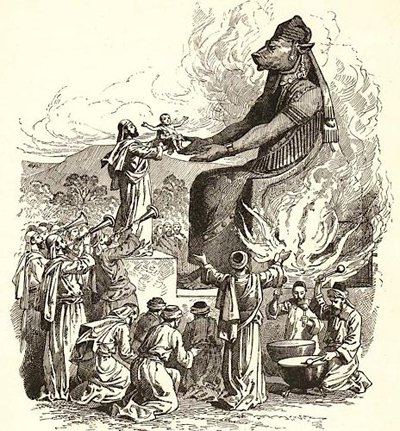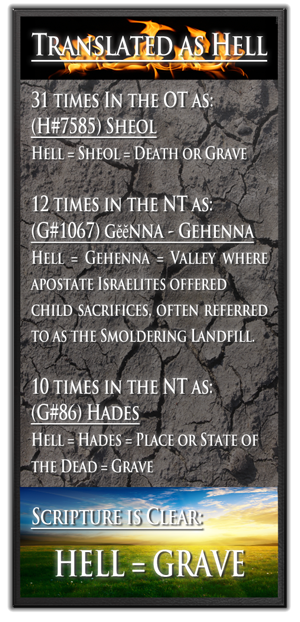The doctrine of an eternally burning hell has caused more heartache, more confusion and led to more people rejecting Yahuwah than possibly any other single belief. Even sinful human beings recoil at the thought of a “justice”  that demands a limitless eternity of anguish as punishment for the sins committed during a single lifetime.
that demands a limitless eternity of anguish as punishment for the sins committed during a single lifetime.
One Bible text that is widely used to support the idea of an eternally burning hell is found in Revelation:
“The same shall drink of the wine of the wrath of [Elohim], which is poured out without mixture into the cup of his indignation; and he shall be tormented with fire and brimstone in the presence of the holy angels, and in the presence of the Lamb: and the smoke of their torment ascendeth up for ever and ever: and they have no rest day nor night, who worship the beast and his image, and whosoever receiveth the mark of his name.” (Revelation 14:10, 11)
The Old Testament uses the word “hell” thirty-one times. It is translated from the Hebrew word Sheol. Far from referring to a place of eternal fires, the word sheol simply referred to the place or condition of the dead:
“Sheol is the abode of the dead, a place of degradation, the locality or condition of those who have died or have been destroyed. . . . It was not understood to be a place of punishment, but simply the ultimate resting place of all mankind (Gen 37:35). . . . . It is not used in one single passage for punishment after the resurrection.” (#7585, The New Strong’s Expanded Dictionary of Bible Words.)
Overtones of eternal burning did not begin to influence the concept of “hell” until the New Testament was translated into Greek.
“If your right eye causes you to sin, pluck it out and cast it from you; for it is more profitable for you that one of your members perish, than for your whole body to be cast into hell. And if your right hand causes you to sin, cut it off and cast it from you; for it is more profitable for you that one of your members perish, than for your whole body to be cast into hell.” (Matthew 5:29, 30)
The word hell is translated ten times from the Greek word Hades which corresponds to Sheol as simply a place or condition of the lost.
 Twelve times, the word “hell” comes from gĕĕnna (gheh'-en-nah) , a reference to a Valley where the apostate Israelites offered child sacrifice. It is used figuratively “as a name for the place (or state) of everlasting punishment.” (#1067, The New Strong’s Expanded Dictionary of Bible Words.)
Twelve times, the word “hell” comes from gĕĕnna (gheh'-en-nah) , a reference to a Valley where the apostate Israelites offered child sacrifice. It is used figuratively “as a name for the place (or state) of everlasting punishment.” (#1067, The New Strong’s Expanded Dictionary of Bible Words.)
Scripture teaches that all who reject salvation and cling rebelliously to sin, will be punished by being burned. However, this must be understood in light of all that the Bible says about the punishment of the wicked.
The accumulated weight of evidence in Scripture reveals that eternal death, not eternal life in torment, is the punishment awaiting all who reject salvation:
“The wages of sin is death; but the gift of [Elohim] is eternal life through [Yahushua our Saviour].” (Romans 6:23)
Thus, the “hell” referred to in Scripture has to do with the punishment received by the wicked which ends in their destruction.
“For behold, the day is coming, burning like an oven, and all the proud, yes, all who do wickedly will be stubble. And the day which is coming shall burn them up,” says Yahuwah of hosts, “That will leave them neither root nor branch. But to you who fear My name the Sun of Righteousness shall arise with healing in His wings; and you shall go out . . . You shall trample the wicked, for they shall be ashes under the soles of your feet on the day that I do this,” Says Yahuwah of hosts. (See Malachi 4:1-3.)
Once the wicked have received just compensation for their sins, Yahuwah says they shall be burned up. When something is “burned up,” there is nothing left to burn.
“Behold, all souls are Mine; The soul of the father as well as the soul of the son is Mine; The soul who sins shall die.” (Ezekiel 18:4)
Thus, the sentence of eternal death will be the ultimate punishment of the wicked who have spurned salvation.
Evildoers shall be cut off; . . . For yet a little while and the wicked shall be no more; Indeed, you will look carefully for his place, But it shall be no more.
. . . the wicked shall perish; And the enemies of [Yahuwah], Like the splendor of the meadows, shall vanish. Into smoke they shall vanish away.
Wait on [Yahuwah], And keep His way, And He shall exalt you to inherit the land; When the wicked are cut off, you shall see it. I have seen the wicked in great power, And spreading himself like a native green tree. Yet he passed away, and behold, he was no more; Indeed I sought him, but he could not be found. (Psalm 37:9, 10, 20, 35-36, NKJV)
In speaking of those who obstinately continue in their sins, Yahuwah states:
“Behold they shall be as stubble, the fire shall burn them; they shall not deliver themselves from the power of the flame; it shall not be a coal to be warmed by, nor a fire to sit before! (Isaiah 47:14)
 But, doesn't the Bible say that the torment will last "forever and ever"?
But, doesn't the Bible say that the torment will last "forever and ever"?
“Now when the thousand years have expired, Satan will be released from his prison and will go out to deceive the nations which are in the four corners of the earth . . . to gather them together to battle, whose number is as the sand of the sea. They went up on the breadth of the earth and surrounded the camp of the saints and the beloved city. And fire came down from [Yah] out of heaven and devoured them. The devil, who deceived them, was cast into the lake of fire and brimstone . . . and they will be tormented day and night forever and ever.” (Revelation 20:7-10)
The English words “forever and ever” are translated from the Greek word aiōn. [ahee-ohn’] It means:
“ ‘An age, era’ and signifies a period of indefinite duration, or time viewed in relation to what takes place in the period. The force attaching to the word is not so much that of the actual length of a period, but that of a period marked by spiritual or moral characteristics. . . . The phrases containing this word should not be rendered literally, but consistently with its sense of indefinite duration.” (#165, The New Strong’s Expanded Dictionary of Bible Words.)
Simply because the phrase refers to an indefinite period of time, does not mean that the period of time extends forever without end. The Bible clearly reveals that the punishment of Satan and the lost WILL have an end, after which they shall be no more.
“You defiled your sanctuaries by the multitude of your iniquities, by the iniquity of your trading; Therefore I brought fire from you midst; It devoured you, And I turned you to ashes upon the earth in the sight of all who saw you. All who knew you among the peoples are astonished at you; You have become a horror, and shall be no more forever.” (Ezekiel 28:18-19)
Ashes do not burn. Rather, ashes are the by-product of something that has finished burning. It is this end, eternal death, to which Yahushua was referring when He stated:
“And do not fear those who kill the body but cannot kill the soul. But rather fear Him who is able to destroy both soul and body in hell.” (Matthew 10:28)
The Lake of Fire which at lasts destroys sin and sinners, destroys even death itself:
“And I saw the dead, small and great, standing before [Yah], and books were opened. And another book was opened, which is the Book of Life. And the dead were judged according to their works, by the things which were written in the books. The sea gave up the dead who were in it, and Death and Hades delivered up the dead who were in them. And they were judged, each one according to his works. Then Death and Hades were cast into the lake of fire. This is the second death. And anyone not found written in the Book of Life was cast into the lake of fire.” (Revelation 20:12-15)
The salvation of the human race from the power of death was the entire purpose behind the Saviour’s mission. Long before He was born as a babe, a prophetic voice declared of Him:
“I will ransom them from the power of the grave; I will redeem them from death. O Death, I will be your plagues! O Grave, I will be your destruction!” (Hosea 13:14)
The destruction of sin, Satan and even death itself has been the focus of faithful hearts ever since Adam and Eve first mourned over the death of Abel. The resurrected righteous will cry with joy:
“Death is swallowed up in victory. O Death, where is your sting? O Hades, where is your victory?” (1 Corinthians 15:54, 55)
The fires that destroy sin and sinners also purify the earth:
“But the day of . . . [Yahuwah] will come as a thief in the night, in which the heavens will pass away with a great noise, and the elements will melt with fervent heat; both the earth and the works that are in it will be burned up.” (2 Peter 3:10)
The Creator will also be the re-Creator. Once the earth has been cleansed of every last trace of sin, Yahuwah will make a new Heavens and a new earth:
“Of old You laid the foundation of the earth, and the heavens are the work of Your hands. They will perish, but You will endure; Yes, they will all grow old like a garment; Like a cloak You will change them, and they will be changed. But You are the same, and your years will have no end. (Psalm 102:25-27)
This earth, the scene of so much misery, will pass away and a new earth will be the eternal abode of the redeemed.
“We according to His promise, look for a new heavens and a new earth, wherein dwelleth righteousness.” (2 Peter 3:13)
 The joy of the saved will be the presence of Yahuwah Himself who, throughout the ceaseless cycles of eternity, will dwell with those who, through faith in the redeeming blood of the Lamb, have been saved from sin and eternal death.
The joy of the saved will be the presence of Yahuwah Himself who, throughout the ceaseless cycles of eternity, will dwell with those who, through faith in the redeeming blood of the Lamb, have been saved from sin and eternal death.
“Now I saw a new heaven and a new earth, for the first heaven and the first earth had passed away. Also there was no more sea. Then I, John, saw the holy city, New Jerusalem, coming down out of heaven from [Yah], prepared as a bride for her husband. And I heard a loud voice from heaven saying, ‘Behold, the tabernacle of [Yah] is with men, and He will dwell with them, and they shall be His people. [Elohim] Himself will be with them and be their [Elohim]. And [Yahuwah] will wipe away every tear from their eyes; there shall be no more death, nor sorrow, nor crying. There shall be no more pain, for the former things have passed away.” (Revelation 21:1-4)
Yahuwah will never condemn any to an eternity of agony. His punishment of His enemies is just, not vindictive.
For Yah so loved the world, that He gave His only begotten Son, that whosoever believeth in Him should not perish, but have everlasting life. For Yah sent not His Son into the world to condemn the world; but that the world through Him might be saved. (See John 3:16-17.)
Rest in the knowledge of the Heavenly Father’s love for you. He will save all who come to Him in faith.
Note: While the wicked will not be tormented forever in a never-ending hell, Scripture does teach that there is an eternally burning fire in the presence of Yahuwah: Eternal Fire Exists!







